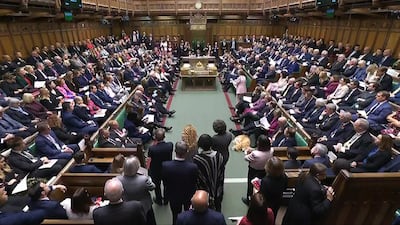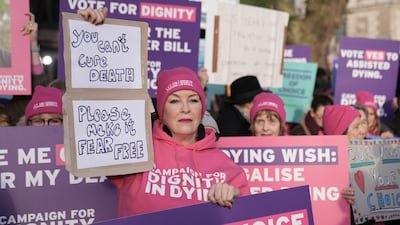Members of Parliament in Britain voted in favour of a proposal to legalise assisted dying on Friday, clearing the first hurdle in a process that could see the disputed bill passed into law.
After a lengthy debate in the House of Commons, the lower chamber, 330 MPs voted in favour of the Terminally Ill Adults (End of Life) bill, with 275 against.
It proposes allowing terminally ill adults with a life expectancy of less than six months to end their lives. Encouraging or assisting suicide is currently against the law in England and Wales, with a maximum jail sentence of 14 years.
The four-and-a-half-hour debate in the Commons heard arguments from MPs about a need to give choice to dying people.
Labour MP Kim Leadbeater insisted her bill has strict safeguards against coercion and said a new law would give society “a much better approach towards end of life”.
She said the approach was not that assisted dying would be a substitute for palliative care, but when that cannot meet the needs of a dying person “the choice of an assisted death should be one component of a holistic approach to end-of-life care”.
Protests as UK parliament debates assisted dying bill – in pictures
Conservative former minister Andrew Mitchell said he had “completely changed” his mind on assisted dying, having found himself with “tears pouring down my face” on hearing the stories of constituents whose loved ones had died “in great pain and great indignity”.
But fellow Conservative Danny Kruger, lead MP for opponents of the bill, said he believed Parliament could do better for terminally ill people than a “state suicide service”.
Mr Kruger's mother, Great British Bake Off judge Dame Prue Leith, has been vocal in her support for legalisation on assisted dying.

Mr Kruger called the bill “too flawed”, while Labour MP Rachael Maskell said the proposed legislation is the “wrong and rushed answer to a complex problem”, and “falls woefully short on safeguarding patients”.
The bill will next go to committee stage where MPs can table amendments, before facing further scrutiny and votes in both the House of Commons and the House of Lords, meaning any change in the law would not be agreed until next year at the earliest.
Ms Leadbeater has said it would probably be a further two years from then for an assisted dying service to be in place.
Assisted dying is legal in the US, Canada, Australia, New Zealand, Spain, Austria, Switzerland, the Netherlands, Belgium and Luxembourg, said Louise Lewis, partner and national head of trusts, estates and tax at national law firm Freeths. The Isle of Man has nearly passed an assisted dying law – it is awaiting royal assent – and Jersey has committed to changing its law to allow it.
“In many of these countries, medically assisted dying is available to people who are not terminally ill and so is more widely available than the current proposed UK law,” said Ms Lewis. “There are strict restrictions around the UK law stating that it must only be used when a person has less than six months to live, which is to be confirmed by doctors.”
Eligibility is therefore strictly controlled, “much more so than in other jurisdictions”, she added. “The current proposed law also goes one step further than other jurisdictions as consent is needed from a High Court judge.
“The procedure for self-selection is therefore stringent, and vulnerable people will have the absolute protection of the court system. How the court system will cope with this may be a question but that is another issue,” said Ms Lewis.









